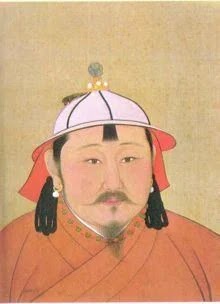He started with a warning: a letter to the pope (Innocent IV), who had requested that the Mongol Empire stop expanding westward. Claiming that Catholics had sent envoys during the time of Genghis Khan and Ögedei Khan (Güyük's grandfather and father, respectively) that had been killed, he decided on a non-compromising reply.
"You must say with a sincere heart: 'We will be your subjects; we will give you our strength'. You must in person come with your kings, all together, without exception, to render us service and pay us homage. Only then will we acknowledge your submission. And if you do not follow the order of God, and go against our orders, we will know you as our enemy."
There is no reason to believe that Güyük wouldn't keep his armies moving until he reached the Atlantic.
He had to deal with some internal issues first, however. His mother, Töregene, was one. She had been regent, and had been instrumental in getting her son elected Grand Khan, but despite her retirement to China, he wanted her potential influence neutralized. She had, during her regency, put several of her favorites in positions of authority. One of her favorites was Fatima.
Güyük's brother, Koden, accused Fatima of damaging his health through witchcraft. When Koden died some months later, Güyük insisted that Töregene turn Fatima over to him. Töregene refused. Güyük's men seized Fatima, sewed up all her orifices, and threw her in the river. Töregene died 18 months later of no apparent cause.
In 1248, Güyük summoned Batu Khan to meet him at the capital. He had once insulted Batu, and the two had their differences, but Batu treated Güyük with the loyalty the Grand Khan deserved. Batu began the journey, but he came with an army. Güyük left the capital and moved westward to meet with Batu, also with an army. Sorghaghtani Beki, Güyük's aunt, sent Batu a warning that he should not trust Güyük.
We'll never know what would have happened, since Güyük died en route. He had been known to be a heavy drinker with poor health. William of Rubruck claimed he was killed in a brawl by Shiban, a younger brother of Batu. The widow, Oghul Qaimish, became regent while Batu and Sorghaghtani arranged to make one of Sorghaghtani's sons, Möngke, the next Grand Khan.
Güyük's death stalled the potential conquest of Europe by the Mongols. Instead, the Mongol Empire looked eastward to continue to make inroads into China. That culminated in another of Sorghaghtani's sons becoming emperor of China. That was Kublai Khan, and we'll talk about him more tomorrow.












